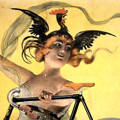Asusana reviewed El maestro y Margarita by Михаил Афанасьевич Булгаков
Review of 'El maestro y Margarita' on 'Goodreads'
Un personaje de pesadilla ha llegado a Moscú, en plena era soviética, con todos sus recovecos administrativos y burocráticos. Volan un mago que pretende presentarse en el teatro aun cuando no cumpla con todos los requisitos y se le interpongan, aunque no por mucho tiempo, los burócratas del arte y la cultura de la Unión Soviética. Este es un libro que en realidad son tres. Comienza como una sátira al sistema soviético de cultura. Donde si supiéramos quiénes son los afectados por la llegada del enigmático Volan, las cosas serían mucho más divertidas. Tienen la sensación de estarte perdiendo algo continuamente, pero aun así el libro es divertido y desde el primer momento el tono te indica que no hay que tomárselo muy en serio.
A la mitad el libro se transforma en fantasía (por medio de una crema corporal) con toques de cuento de hadas ruso. Si has tenido …
Un personaje de pesadilla ha llegado a Moscú, en plena era soviética, con todos sus recovecos administrativos y burocráticos. Volan un mago que pretende presentarse en el teatro aun cuando no cumpla con todos los requisitos y se le interpongan, aunque no por mucho tiempo, los burócratas del arte y la cultura de la Unión Soviética. Este es un libro que en realidad son tres. Comienza como una sátira al sistema soviético de cultura. Donde si supiéramos quiénes son los afectados por la llegada del enigmático Volan, las cosas serían mucho más divertidas. Tienen la sensación de estarte perdiendo algo continuamente, pero aun así el libro es divertido y desde el primer momento el tono te indica que no hay que tomárselo muy en serio.
A la mitad el libro se transforma en fantasía (por medio de una crema corporal) con toques de cuento de hadas ruso. Si has tenido el placer de leer alguno de estos, esta parte te encantará.
Entreverado en las dos partes hay una tercera narración: extractos de una novela que uno de los personajes ha escrito. Esta es una novela histórica que tiene relación con ambas partes de maneras muy distintas.
Es un libro muy entretenido e interesante, también es un poco extraño. Si te gusta, lo extraño, no será un problema.
Lo único que hay que tomar en cuenta es que la traducción puede ser un poco incómoda de leer, por lo que conseguí otra traducción diferente y según cada parte, una era mejor traducción que la otra en distintos capítulos. Así que leía una versión y luego pasaba a la otra. Esto es algo que me ha pasado antes con autores rusos, por lo que sospecho que la estructura del idioma es muy diferente a la del español.









